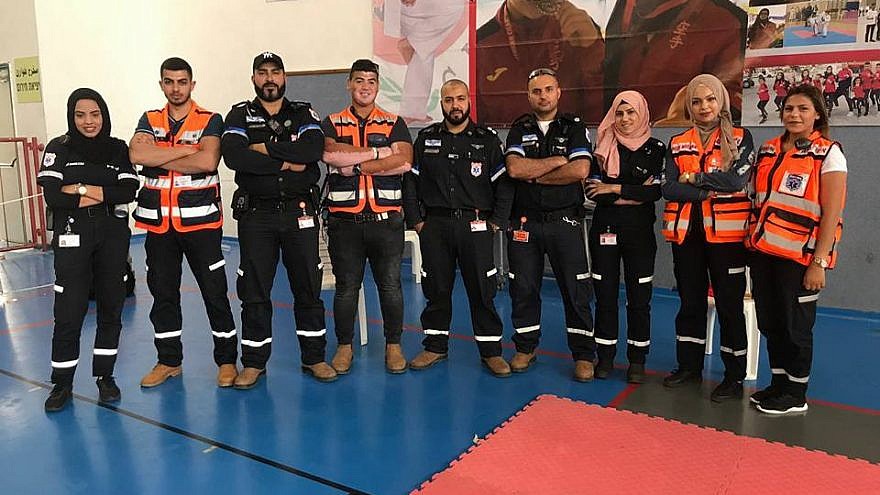Five United Hatzalah emergency-medical volunteers responded to a large-scale fire in Umm al-Fahm on June 13, the penultimate day of the month of Ramadan—the holiest month in the Muslim calendar. The blaze took place in an auto-body parts store and quickly spread to other buildings, even engulfing part of the wooded area behind the store. The resulting fire was massive and endangered a number of buildings, residents and passersby. A number of teenagers who were in the area became trapped and were threatened by the blaze. Numerous children sustained light injuries and suffered from smoke inhalation.
United Hatzalah volunteer EMT Sanaa Mahameed, who lives in Umm al-Fahm, said: “I wasn’t in the city when the blaze began, but shortly thereafter, rescue services asked for all available responders in the area to come as they feared that it would turn into a mass casualty incident. Luckily, that didn’t happen, and only a few people were lightly injured. We provided those suffering from smoke inhalation with high-flow oxygen and treated the light injuries that the teenagers had sustained.”
“It is hard to go from call to call during a fast,” he acknowledged. “It’s not that I’m hungry, but it is hot outside, especially during the summer, and after responding to emergencies, especially a large fire like today, one gets very thirsty. I’ve seen a lot of people faint due to the combination of the heat and the fast and the lack of essential vitamins.”

While Jews fast for six days a year throughout the calendar, Muslims fast for 30 days straight, not eating or drinking anything during the daylight hours for an entire month. Only after night falls can they eat or drink. It is a marathon of fasting—one that makes keeping with a daily routine extremely difficult. Responding to emergency calls in the middle of that routine is even more challenging, yet the nearly 400 Muslim volunteers of United Hatzalah do it every day.
“For me, it is not a question of whether to respond or not,” said Mahameed. “Fast or no fast, if there is someone who needs help or a life needs saving, then I will do whatever I can to help the person and save their life. That is why I do what I do.”
‘A true sign of selfesslessness’
Murad Aliyan, who sits on the board of the organization and plays a vital role in coordinating the Muslim volunteers and chapters in the organization, said Ramadan “is one of the hardest things for a Muslim first-responder. Between the heat and the continued fasting every day for a month, a person feels at a certain point that they have no more energy to do anything that is not absolutely necessary. In spite of all that, there are some people who are filled with motivation to go out and save lives in the quickest and most professional way possible.
“At the end of the day, our goal is to save lives, and it doesn’t matter to us who those lives belong to or where they are located. If we can help them, we will,” he said. “The motivation of our Muslim volunteers, which is usually exceptionally high, is even more so this month. We have gotten used to giving everything we have got even while fasting and facing the intense heat of a Middle Eastern summer.”

President and founder of United Hatzalah Eli Beer spoke about the dedication of these volunteers. “It is certainly not an easy thing to respond to calls while fasting. For me, to do it while fasting for a month is unfathomable, yet here we have 400 volunteers who do it every year, every day, for a month. It is certainly a true sign of selflessness, and nothing makes me prouder than seeing our volunteers responding and saving lives, regardless of what circumstances they were in beforehand.”
Whether it is responding to a fire, such as the group from Wadi Ara did on June 12, or responding to a CPR call in Abu Gosh, continued Beer, “Muslim volunteers really are going above and beyond the call of duty to help others regardless of religion, national association or politics. They truly are heroes.”

























